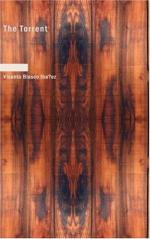But the hero who was risking his life to save a family of poor folks out there in the darkness of that sticky, murky, sepulchral night, had in mind only one thing—a blue house, into which he was to penetrate at last, in so strange and romantic a fashion.
From time to time a scraping sound or a jolt of the boat would bring him back to reality.
“Your tiller there!” Cupido would shout, without, however, taking his eyes from the water ahead. “Look out, Rafaelito, or we’ll get smashed!”
The boat was indeed a good one, for any other, would long before have come to grief in those rapids jammed with rocks and debris.
They were around the city in no time. Few lighted windows were now to be seen. High, steep banks of slippery mud—quite unscalable—crested with walls, were slipping past on either hand, with an occasional palisade, the piles just emerging from the water. Somewhat ahead, the open river, where the two arms that girt the Old City reunited in what was now a vast lake!
The two men went on blindly. All normal landmarks were gone. The banks had disappeared, and in the blackness, beyond the red circle of torch light, they could make out only water and then more water—an immense incessantly rolling sheet that was taking them they knew not where. From time to time a black spot would show above the muddy surface; the crest of some submerged canebrake; the top of a tree; a strange, fantastic vegetation that seemed to be writhing in the gloom. The river, free now from the gorges and shallows around the city, had ceased its roaring. It seethed and swirled along in absolute silence, effacing all trace of the land. The two men felt like a couple of shipwrecked sailors adrift on a shoreless, sunless ocean, alone save for the reddish flame flickering at the prow, and the submerged treetops that appeared and vanished rapidly.
“Better begin to row, Cupido,” said Rafael. “The current is very strong. We must be still in the river. Let’s turn to the right and see if we can get into the orchards.”
The barber bent to the oars, and the boat, slowly, on account of the current, came around and headed for a line of tree-tops that peered above the surface of the flood like seaweed floating on the ocean. Shortly the bottom began to scrape on invisible obstacles. Entanglements below were clutching at the keel, and it took some effort occasionally to get free. The lake was still dark and apparently shoreless, but the current was not so strong and the surface had




